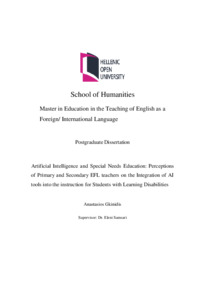- MSc thesis
- Διδακτική της Αγγλικής ως Ξένης/Διεθνούς Γλώσσας (ΑΓΓ)
- 12 July 2025
- Ελληνικά
- 89
- Ελένη Σαμσάρη
- Ελένη Σαμσάρη, Βασίλειος Ζορμπάς
- Artificial Intelligence, ICT, inclusive education, learning difficulties, teacher training, digital divide, educational technology, ethical concerns
- AAΓΔΕ
- 5
- 2
- 37
-
-
Η παρούσα μελέτη εξετάζει τον ρόλο των Τεχνολογιών Πληροφορίας και Επικοινωνιών (ΤΠΕ) και της Τεχνητής Νοημοσύνης (ΤΝ) στον μετασχηματισμό της εκπαιδευτικής διαδικασίας, με έμφαση στη συμβολή τους στη συμπεριληπτική μάθηση μαθητών με μαθησιακές δυσκολίες. Εργαλεία ΤΠΕ, όπως τα συστήματα διαχείρισης μάθησης και οι πλατφόρμες τηλεδιάσκεψης, διευκολύνουν την εξατομικευμένη διδασκαλία και την πρόσβαση στη γνώση, ενώ τεχνολογίες ΤΝ, όπως τα προσαρμοστικά συστήματα διδασκαλίας και οι εφαρμογές αναγνώρισης φωνής, ενισχύουν την υποστήριξη μαθητών με γνωστικές ή επικοινωνιακές προκλήσεις.
Τα δεδομένα από συνεντεύξεις εκπαιδευτικών δείχνουν ότι, παρά την αναγνώριση των δυνατοτήτων της ΤΝ ως προς την παρακίνηση, τη συνεργασία και την ενίσχυση της συμπερίληψης, η κατανόηση των λειτουργιών και των εφαρμογών της παραμένει περιορισμένη. Κύρια εμπόδια για την ενσωμάτωσή της αποτελούν η έλλειψη υποδομών, οι οικονομικοί περιορισμοί, η ανισότητα πρόσβασης, η ανεπαρκής επιμόρφωση και οι ηθικές ανησυχίες σχετικά με την προστασία δεδομένων και την αλγοριθμική μεροληψία.
Η μελέτη καταλήγει ότι οι ΤΠΕ και η ΤΝ διαθέτουν σημαντικές δυνατότητες στη διαμόρφωση εξατομικευμένων και ισότιμων μαθησιακών περιβαλλόντων, ωστόσο η αποτελεσματική αξιοποίησή τους προϋποθέτει επαγγελματική ετοιμότητα, θεσμική υποστήριξη και κριτική προσέγγιση.
-
This study explores the evolving role of Information and Communication
Technology (ICT) and Artificial Intelligence (AI) in transforming educational practices,
with a specific focus on their potential to enhance inclusive learning for students with
learning difficulties. ICT tools such as learning management systems, video conferencing platforms, and digital assessment applications have been shown to improve engagement, collaboration, and personalized instruction, creating greater accessibility for diverse learners. Similarly, AI technologies offer adaptive teaching, intelligent tutoring, and assistive tools such as speech-to-text, which can provide valuable support for students with cognitive, communicative, and physical challenges.Findings from the interviews with educators reveal that while teachers generally
acknowledge AI as an innovative and promising tool, their understanding of its functions and educational applications remains limited. Many educators demonstrate only a basic awareness of AI, often associating it with widely known tools such as ChatGPT or Turnitin, while a smaller number exhibit deeper insights into its potential classroom uses. Despite recognizing the benefits of AI for motivation, communication, and inclusivity,teachers emphasize that successful integration requires systematic professional development, sufficient institutional support, and ongoing adaptation to technological advances.Key challenges identified include the digital divide, lack of infrastructure, financialconstraints, insufficient training opportunities, and ethical concerns relating to data privacy, algorithmic bias, and transparency. Educators further caution against overrelianceon AI, warning that it should complement rather than replace traditional teaching practices.The findings underscore the importance of professional readiness and critical engagement to ensure that technology adoption enhances rather than undermines learning.Overall, the study concludes that ICT and AI hold significant promise in creating equitable, personalized, and dynamic educational environments, but their effective implementation depends on overcoming both individual and systemic barriers.
-
- Hellenic Open University
- Attribution-NonCommercial-NoDerivatives 4.0 Διεθνές
Τεχνητή Νοημοσύνη και Ειδική Αγωγή: Αντιλήψεις Εκπαιδευτικών Αγγλικής ως Ξένης Γλώσσας στην Πρωτοβάθμια και Δευτεροβάθμια Εκπαίδευση σχετικά με την Ενσωμάτωση Εργαλείων Τεχνητής Νοημοσύνης στη Διδακτική Πράξη για Μαθητές με Μαθησιακές Δυσκολίες
Artificial Intelligence and Special Needs Education: Perceptions of Primary and Secondary EFL teachers on the Integration of AI tools into the instruction for Students with Learning Disabilities (english)
Main Files
 Artificial Intelligence and Special Needs Education: Perceptions of Primary and Secondary EFL teachers on the Integration of AI tools into the instruction for Students with Learning Disabilities
Artificial Intelligence and Special Needs Education: Perceptions of Primary and Secondary EFL teachers on the Integration of AI tools into the instruction for Students with Learning Disabilities
Description: Dissertation Anastasios Gkinidis.pdf (pdf) Book Reader
Size: 1.5 MB

